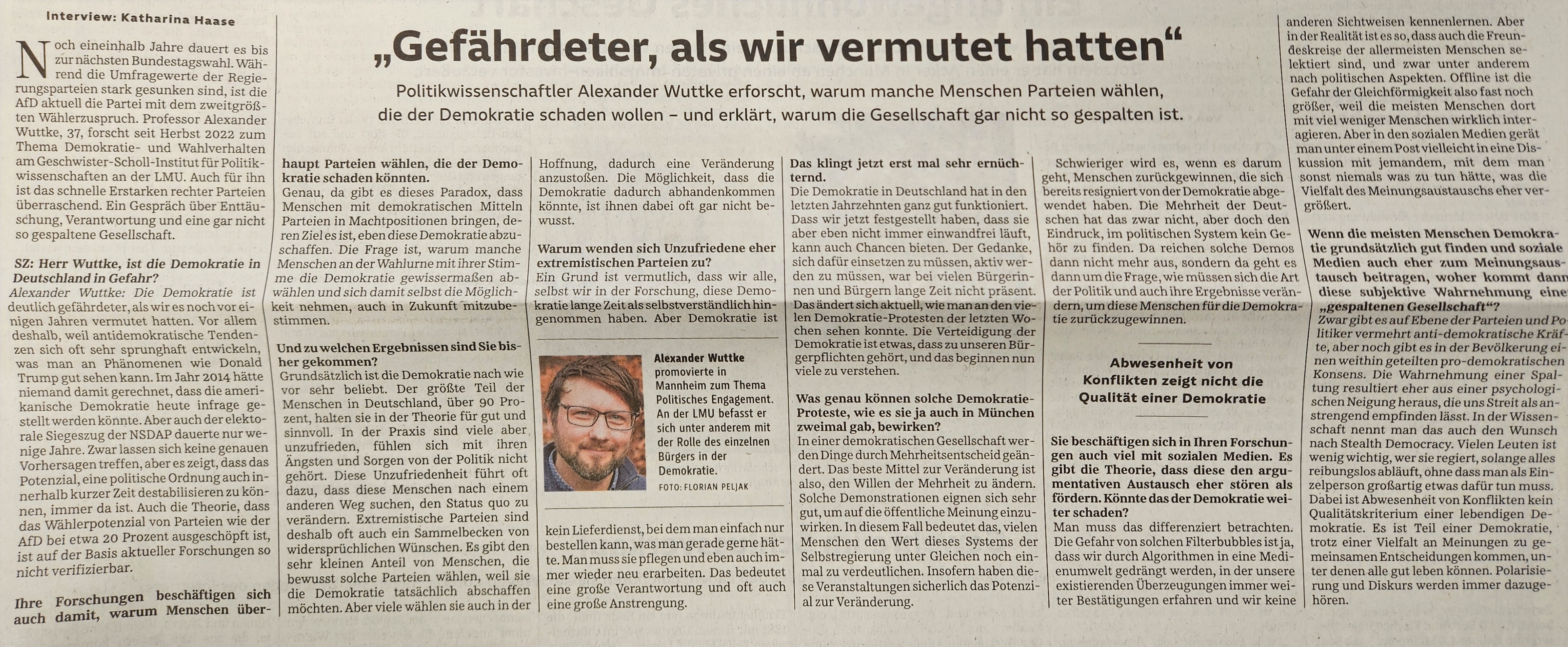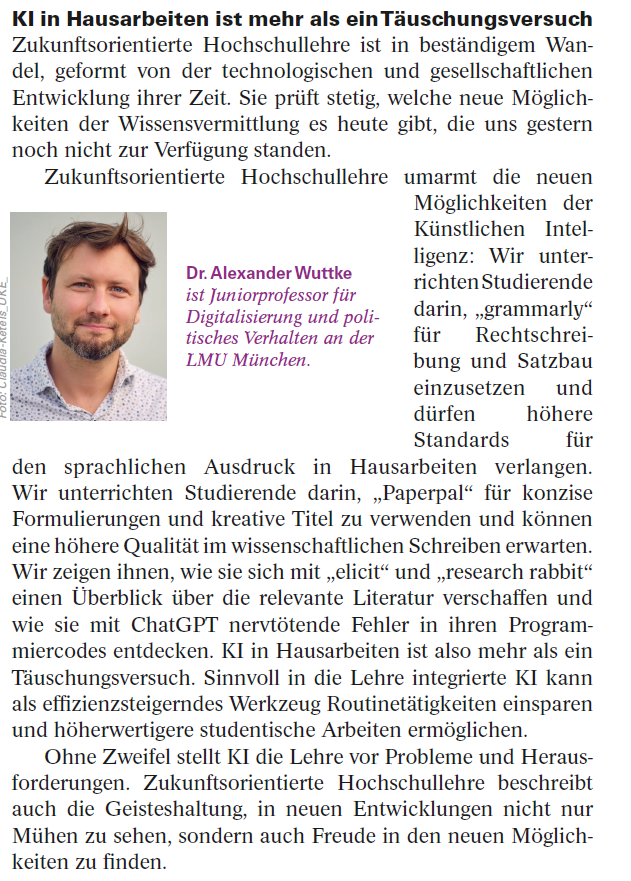Digitalization and Political Behavior, LMU Munich
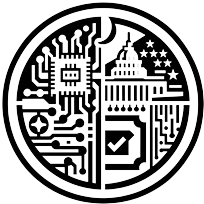
Led by Prof. Dr. Alexander Wuttke, the teaching unit investigates the state of liberal democracy from the perspective of ordinary citizens and it explores the challenges and opportunities afforded by digitalization. We strive for transparency, rigor, and inclusivity in our research culture. We use computational social science approaches and a broad array of methods for causal inference.
News
| 2025/07 | New Scientist reports on AI study |
Title: “How government use of AI could hurt democracy” Teaser: Countries are eager to use AI to automate some government processes, but this risks eroding citizens’ trust and feelings of democratic control – because AI mistakes can ruin their lives. |
|
| 2025/06 | New Study: Replication of “Why voters who value democracy participate in democratic backsliding” in Germany’s multi-party context |
This report documents our replication of Braley et al.’s (2023) study, which examined whether voters become less willing to subvert democratic norms upon learning that their political opponents are more committed to democracy than previously assumed. The original study found that correcting voters’ misperceptions about their opponents’ democratic commitments effectively reduced their own willingness to undermine democratic norms. We replicate this finding within the German multiparty context, performing a direct replication with minimal modifications to the original design. Necessary adaptations address the multiparty structure in Germany, where identifying an out-party is less straightforward than in a two-party system. Additionally, we refined some survey items to enhance clarity. Consistent with the original findings, our replication study shows that correcting voters’ misperceptions about the democratic commitment of out-partisans reduces their own willingness to subvert democratic norms, from 0.25 in the control group to 0.19 in the treatment group (on a 0-1 scale). In standardized terms, the observed treatment effect size (Cohen’s d = 0.4) closely matches the original effect, exceeding it by 8%. |
|
| 2025/06 | New Interview on Open Science: “A preregistration plan is a plan, not a prison” |
In a recent interview with ZBW, Alexander Wuttke discusses the importance of preregistration and Registered Reports in enhancing transparency and credibility in scientific research. Highlighting practical strategies for integrating Open Science practices into academic and policy contexts, Wuttke shares insights from his experience as Special Editor for Registered Reports at the Journal of Politics and emphasizes the benefits of preregistration as a tool for structured and reliable research. Read the full interview [here]. |
|
| 2025/05 | Pre-Print: Observing many students using difference-in-differences designs on the same data and hypothesis reveals a universe of uncertainty |
We have fundamentally revised the manuscript of a study that reports on a many-analysts project that we conducted in courses on research design at LMU Munich with our LMU political science students as co-authors. The paper shows how many-analysts studies can be effectively integrated into undergraduate methods courses. Abstract The rise of many-analysts studies has highlighted substantial variability in research outcomes when different teams independently analyze the same datasets and hypotheses. This paper makes two key contributions to this emerging field. First, we demonstrate how the many-analysts framework can be integrated into research methods education, by having students act as independent analysts addressing the same research question, followed by a meta-analysis of their results. Enriching the pedagogical toolkit, this didactic approach teaches concepts like researcher degrees of freedom and the importance epistemic humility. Second, this study applies the many-analysts framework to causal inference using observational data to identify outcome variability in this area of research. Specifically, we engage students in independent difference-in-differences (DiD) analyses focused on local governance. The study reveals a wide range of effect sizes and divergent conclusions from a typical DiD design, emphasizing the benefits of robustness checks involving multiple independent analysts in research and teaching. |
|
| 2025/04 | DFG Project Funded: Democratic Persuasion - How to Make The Case for Democracy |
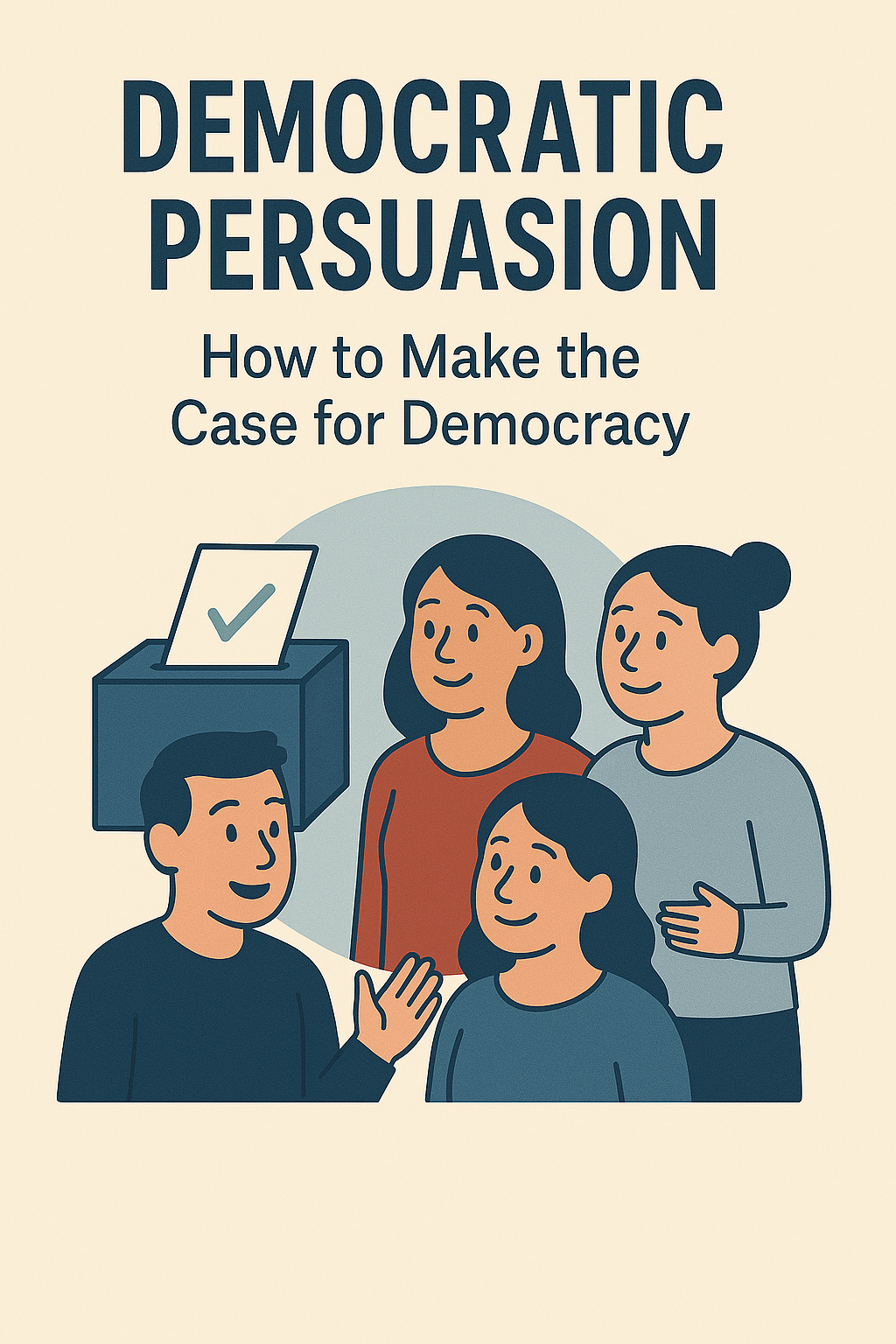 |
The German Research Foundation (DFG) has approved funding for our new research project “How to Make the Case for Democracy.” The project will run for three years and supports two positions, enabling us to explore innovative and empirically grounded strategies to strengthen public support for democracy in established democratic societies. Addressing a Subtle Threat to DemocracyIn many countries, democratic backsliding no longer happens through overt authoritarian takeovers, but rather through democratic elections and the choices of ordinary citizens. This subtle erosion of democracy highlights the need to better understand and reinforce democratic commitment among the public. A Multi-Dimensional Approach to Democratic SupportOur project is based on the premise that support for democracy is not a binary attribute but a multi-dimensional construct. Citizens may strongly support some democratic principles while holding reservations about others. These fissures in democratic attitudes require different communicative responses tailored to individual profiles. Evidence-Based Democratic PersuasionThe project draws on cutting-edge research in psychology and political communication to design and test theory-driven interventions. We will explore the effectiveness of these interventions through three complementary experimental approaches:
The goal is to provide robust, actionable insights on how communication can effectively strengthen democratic orientations and counteract anti-democratic narratives. Societal ImpactOur findings are intended to support politicians, civil society organizations, educators, and journalists in developing and implementing communication strategies that bolster democratic resilience. By empirically testing what works, this project contributes to the broader effort to defend democracy from within. Join Our TeamTo support this endeavor, we will soon be recruiting a PhD student and a Postdoctoral Researcher, each for a duration of three years. The positions will focus on Political Psychology, Experimental Methods, or Computational Methods. Job advertisements will be published in the coming weeks. |
| 2025/04 | New Computational Social Science Master’s program at LMU |
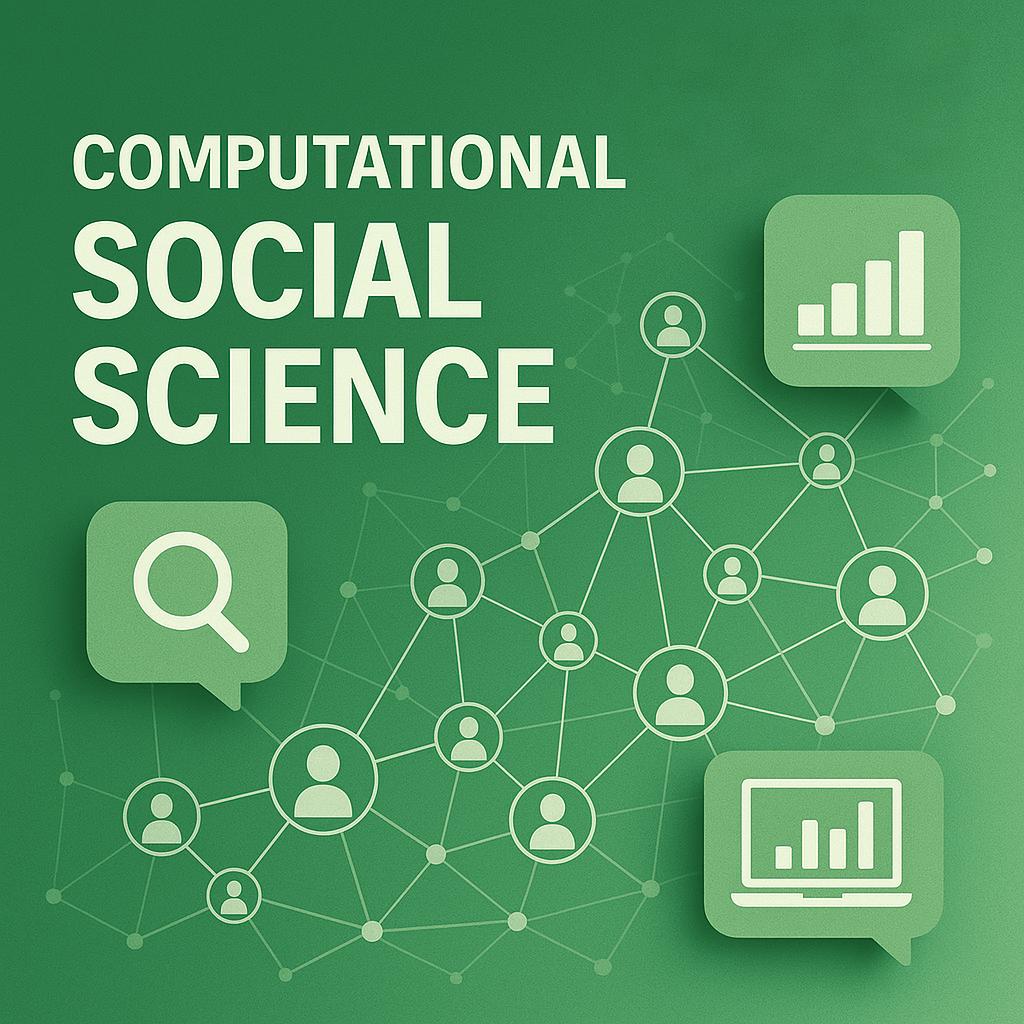 |
We are excited to announce the launch of the new M.A. in Computational Social Science at Ludwig-Maximilians-Universität München. This interdisciplinary program combines social science theory with data science methods to explore and understand complex societal phenomena in the digital age. Applications for the first cohort are now open! Prospective students are warmly invited to join our upcoming information session, where we will introduce the program structure, content, and application process, and answer your questions. For more information about the program and the info session, please visit our website: The program is jointly coordinated by Prof. Dr. Mario Haim, Prof. Dr. Carsten Schwemmer, and Prof. Dr. Alexander Wuttke. |
| 2025/03 | AI Conversational Interviewing: Transforming Surveys with LLMs as Adaptive Interviewers |
This is our first computer science conference publication. Accepted at LaTeCH-CLfL 2025. A little bit proud of this truly interdisciplinary research project with a great list of collaborators: Matthias Aßenmacher, Christopher Klamm, Max M. Lang, Quirin Würschinger, Frauke Kreuter. https://arxiv.org/abs/2410.01824
|
|
| 2025/03 | The reliability of replications: a study in computational reproductions |
A few years ago, we embarked on the Many-Analyst project—originally envisioned as a small side project for a conference we organized. However, it quickly grew into a large-scale, ambitious endeavor. A special thanks to Nate Breznau for his unwavering leadership in keeping everything on track. We are thrilled that another publication emerging from this project has just been published in Royal Society Open Science. This study investigates researcher variability in computational reproduction, an activity for which it is least expected. Eighty-five independent teams attempted numerical replication of results from an original study of policy preferences and immigration. Reproduction teams were randomly grouped into a ‘transparent group’ receiving original study and code or ‘opaque group’ receiving only a method and results description and no code. The transparent group mostly verified original results (95.7% same sign and p-value cutoff), while the opaque group had less success (89.3%). Second-decimal place exact numerical reproductions were less common (76.9 and 48.1%). Qualitative investigation of the workflows revealed many causes of error, including mistakes and procedural variations. When curating mistakes, we still find that only the transparent group was reliably successful. Our findings imply a need for transparency, but also more. Institutional checks and less subjective difficulty for researchers ‘doing reproduction’ would help, implying a need for better training. We also urge increased awareness of complexity in the research process and in ‘push button’ replications. |
|
| 2024/11 | Slides on Digital Democracy |
I recently gave several talks and lectures on digital democracy, its promises and problems. I discuss fake news, filter bubbles, liquid democracy, and people’s support for democracy. |
|
| 2024/10 | Pre-Print on AI Conversational Interviewing |
AI Conversational Interviewing: Transforming Surveys with LLMs as Adaptive Interviewers Alexander Wuttke, Matthias Aßenmacher, Christopher Klamm, Max M. Lang, Quirin Würschinger, Frauke Kreuter
|
|
| 2024/09 | DLF Interview: Citizens’ Assemblies |
I was interviewed for “Systemfragen” on the promises and problems of citizen assemblies. |
|
| 2024/08 | New Publication: A Very Short Summary of What We Know about Populist Attitudes |
Written with Anne Schulz, we have published an entry in the new Elgar Encyclopedia of Political Communication. |
|
| 2024/07 | BR24 Mitreden: Extreme im Aufwind - Was müssen die anderen Parteien besser machen? |
I participated in a live TV broadcast along with Marie-Agnes Strack-Zimmermann and Marina Weißband on the state of democracy. |
|
| 2024/06 | New publication: Making the case for democracy: A field-experiment on democratic persuasion |
This study with my friend Florian Foos was special. During the COVID pandemic we held townhalls on COVID politics with citizens and politicians and we participated in all of them as moderators or experts. For many citizens, this was the first time they could voice their grievances, fears and hopes in a public forum. So, being part of this project, was quite different from our typical office jobs. Also, we learned important insights on how to foster democracy’s societal foundations, see below. Abstract Ordinary citizens can serve as a critical defence against democratic backsliding. But beneath the surface, citizens’ commitment to democracy is sometimes fragile, with crises exacerbating existing anxieties. We introduce ‘democratic persuasion’ as an actionable intervention to foster the resilience of citizens’ commitment to liberal democracy. ‘Democratic persuasion’ seizes the opportunity of communicating with wavering democrats. ‘Democratic persuasion’ entails actively making the case for democracy and discussing democracy’s inherent trade-offs while engaging existing doubts and misperceptions. Amid the COVID-19 pandemic, which stirred frustrations with democracy and highlighted democratic trade-offs, we invited citizens via Facebook to participate in one of sixteen Zoom town halls to engage in discussions on pandemic politics with members of German state and federal parliaments. Each representative hosted two town halls, with random assignment to a condition of ‘democratic persuasion’ in one of the two town hall meetings. The field experiment yielded mixed results, demonstrating significant effects on some indicators of democratic commitment but not on others. This study contributes to the nascent body of research aimed at reinforcing the societal pillars of liberal democracies. |
|
| 2024/04 | New team members |
Dr. Nadine Zwiener-Collins has joined the team as a Postdoctoral researcher. She studies public opinion and political behavior. Next to teaching at GSI, she contributes to the study that evaluates Registered Reports at JOP. Valeriya Barakhvostova joins as a Research assistant. She will support an ongoing study that implements and tests AI Interviewers, i.e. using Large Language Models for In-Depth Interviewing. |
|
| 2024/03 | DLF-Interview on Survey Methodology |
Can we trust surveys? Are representative polls possible? Feature in DLF-Systemfragen with soundbites by Rainer Schnell, Werner Krause and myself in German. |
|
| 2024/03 | SZ-Interview on Democracy |
German Newspaper Süddeutsche (Katharina Haase) talked with me about democracy and the ongoing protest against the Alternative für Deutschland. |
|
| 2024/01 | Opinion piece in “Forschung&Lehre” (german) |
Forschung & Lehre published a collection of opinion pieces on “Teaching Today” where I shared my thoughts on artificial intelligence in teaching.
|
|
| 2023/12 | Open Postdoc Teaching position (50%, 1 Year) [position filled] |
There is an open position for a Postdoc at our Teaching Unit for Digitalization and Political Behavior. The position is part-time, starting April 1st for two semesters. It is for teaching one course each semester. The position can be combined with an existing position at LMU (up to 50%) or another university (up to 70%). Applications are encouraged as early as possible. Find more information here. |
|
| 2023/12 | FAZ newspaper covers study on populist attitudes |
| Boris Holzer published a summary of our Registered Report study (Nils Steiner, Christian Schimpf, Alexander Wuttke) in Frankfurter Allgemeine Zeitung, titled “Der Aufstand der Abgehängten: Warum ist die Wählerschaft populistischer Parteien so divers?” | |
| 2023/12 | Slides on AI in teaching |
| I published some slides (German) | |
| 2023/11 | R Web course |
New Resource to Learn R for Social Science the gentle, fun, and accessible way - no hassle to install R(Studio). Dive right in - individualized feedback - code on your own, within the web browser - plotting, data wrangling and analysis Made by Philipp Schröder, Laura Kiemes and Alexander Wuttke. Made possible by funding from LMU and Geschwister Scholl Institute. |
|
| 2023/11 | AI Symposium |
The state of Bavaria established a large number of AI professorships in the past years. Today, 10 newly appointed LMU AI and Data Science professors presented their research. |
